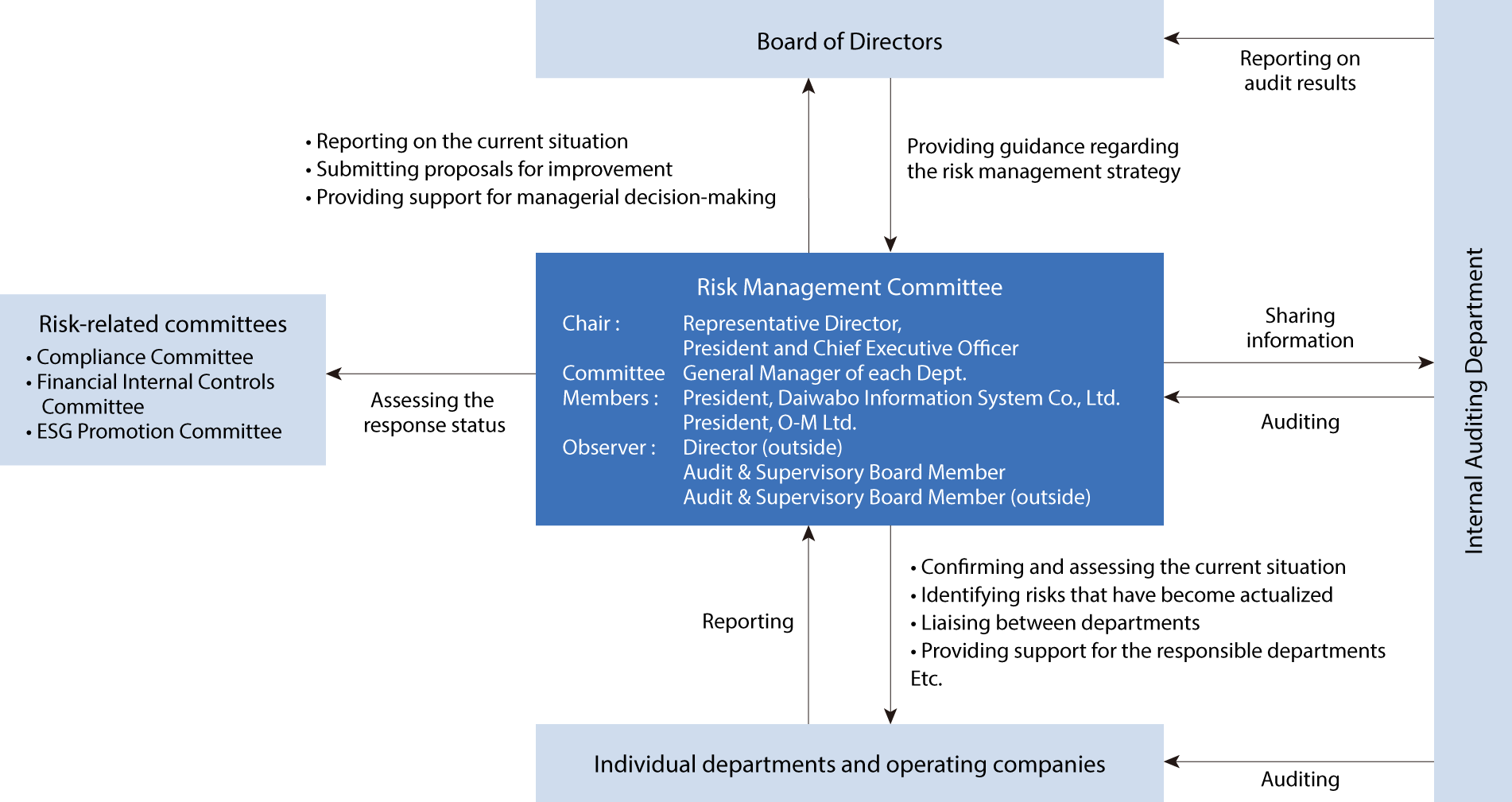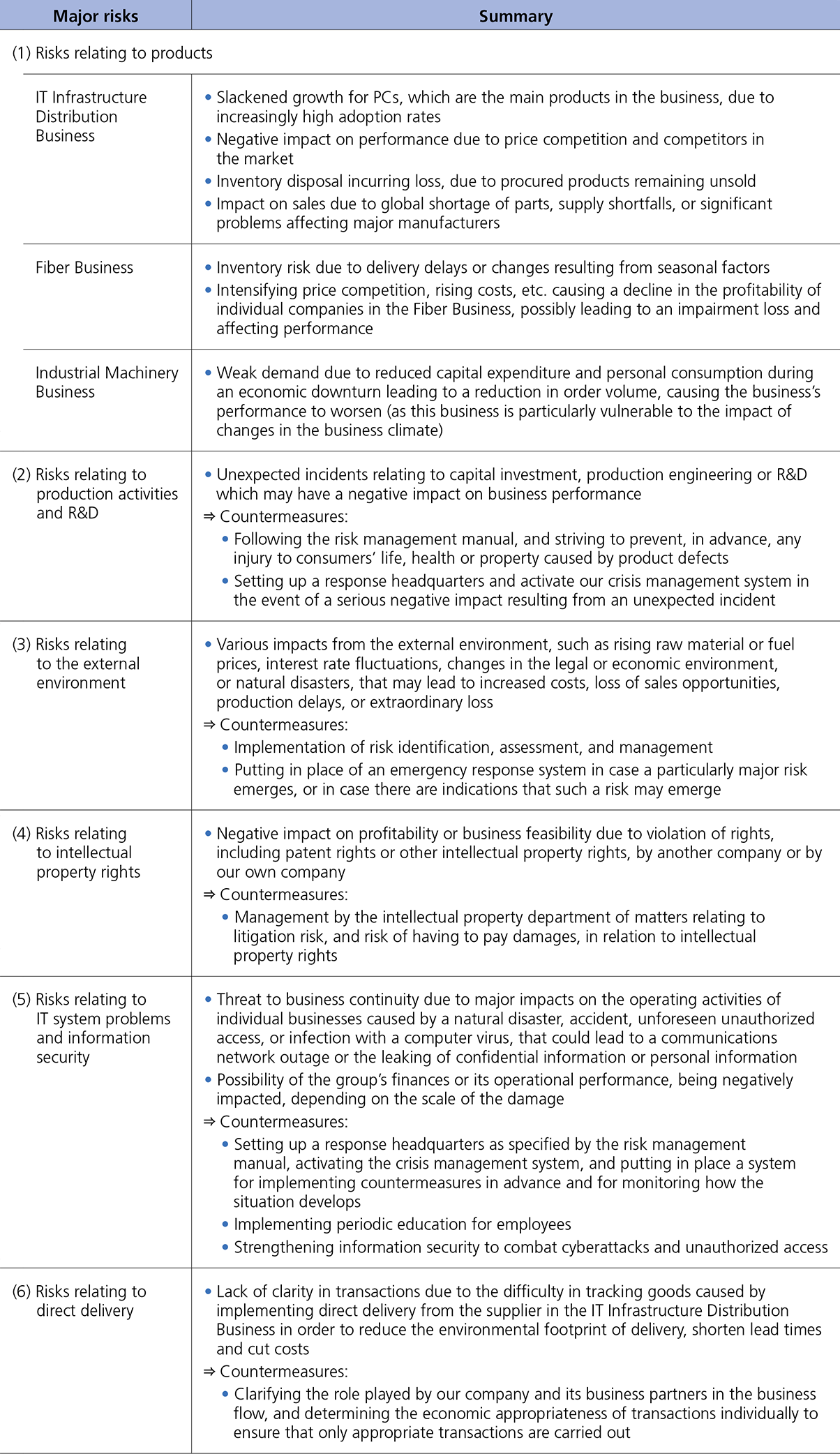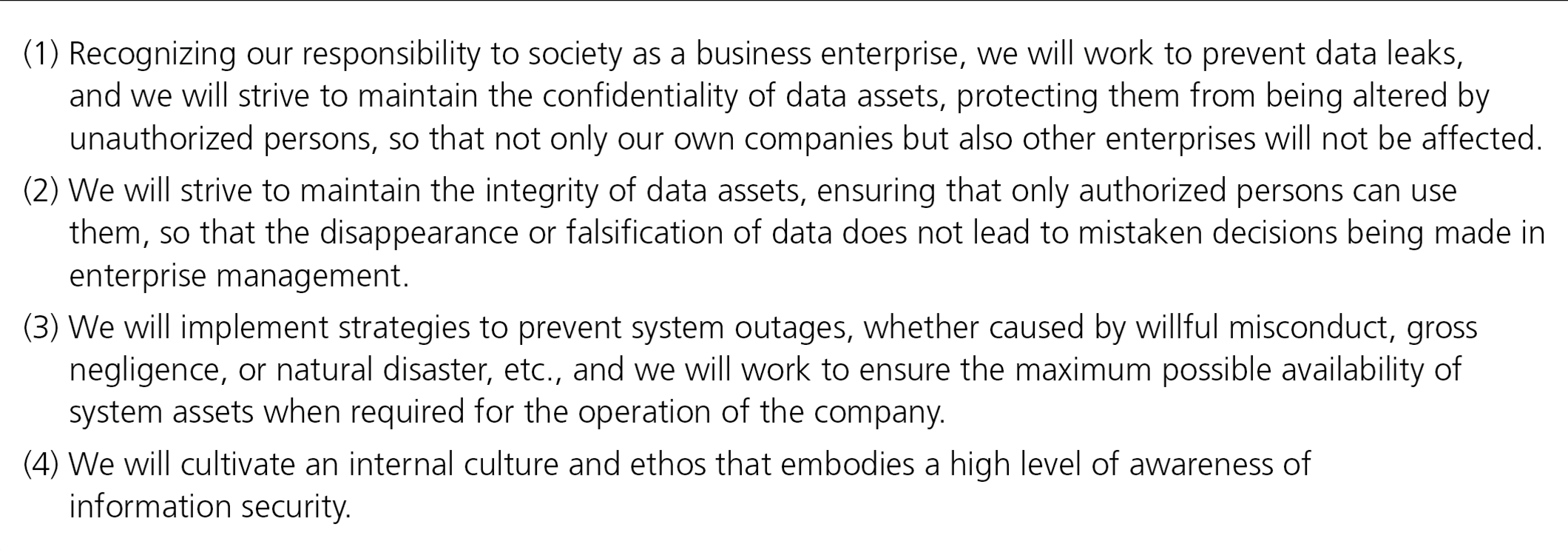The Daiwabo Group’s basic policy is for the entire organization, including every individual manager and every individual employee, to comply with all legal requirements and internal rules, and fulfill the company’s social responsibility by respecting corporate ethics and social norms.
The Daiwabo Group Charter of Corporate Behavior embodies the Daiwabo Group’s commitment to respecting human rights and complying with all laws and international rules, both within and outside Japan, and its commitment to fulfilling its social responsibility with social decency and high ethical standards, to contribute toward the sustainable development of society. All employees and all company officers are required to abide by the charter.
So that we can thoroughly disseminate the respect for the law and corporate ethics stipulated by the charter among all group employees and company officers, Daiwabo works to ensure familiarity with relevant laws, compiles internal rules and manuals, and strives to implement effective employee education.
Daiwabo has established a Compliance Committee, chaired by the representative director, which promotes and oversees measures relating to compliance with legal requirements and to corporate ethics horizontally across the entire Daiwabo Group. Meetings of the Compliance Committee are held on a quarterly basis, and the committee works to stimulate and spread compliance awareness by maintaining and managing the group’s compliance system, and overseeing the provision of compliance education for all employees.
We plan to have all employees of the Daiwabo Group in Japan participate in compliance education once a year, in which the compliance issues in the industry and those that have emerged within the group are shared with all employees as case studies. By gradually making improvements, we are aiming to expand the content of our compliance education.
To prevent in advance, discover at an early stage, and respond effectively to compliance violations in our business activities, we have established an internal whistleblowing system within the Daiwabo Group. If a consultation regarding harassment and overall compliance issue (including anti-corruption due to corruption, bribery, etc) is requested, and a violation of laws or ethics, or actions which it is feared may involve a violation of laws or ethics, are discovered, then the reporting party can submit a report or a request for consultation, either anonymously or giving their real name, whichever they prefer. Besides the internal contact point for receiving reports and requests for consultation, there is also an external contact point, and reports and requests for consultation can be submitted by e-mail, telephone, or letter, making the system as user-friendly as possible. When a report or request for consultation is received, the secretariat of the Compliance Committee plays a central role in liaising with other relevant departments, and works speedily to investigate and confirm, as far as possible, the facts of the case and the relevant laws and rules. Based on this, a determination is made as to whether a compliance violation has occurred, and where necessary measures are taken in response to remedy the situation and/or prevent recurrence. In such cases, besides safeguarding the anonymity and privacy of the reporting party, any retaliatory action is strictly prohibited, and measures are taken to ensure that the reporting party does not suffer any adverse treatment due to submitting the report. The reporting party receives feedback as appropriate regarding the subsequent confirmation and investigation of the case, and the final outcome.
The Daiwabo Group has a low level of dependency on specific business partners, products, technologies, and regulations, and enjoys relatively stable operational performance. However, the industry that we belong to has been experiencing significant changed in terms of technology, and thus there is a possibility that the emergence of new products or services may lead to structure change in the industry, which could cause change in demand for existing products and services and might also affect the group’s sales and profitability. To be ready to adapt to such change, we are constantly listening to customer feedback and monitor new trends in technology development, putting in place the framework needed for the group as a whole to respond promptly to customers’ needs. We have also established a system whereby we implement risk identification, assessment, and management. If a particularly major risk emerges, or if there are indications that such a risk may emerge, we set up a response headquarters, activate our crisis management system, implement preventive measures or crisis response measures as appropriate, and monitor how the situation develops.
We aim to implement appropriate risk management by adopting a wide-ranging perspective that covers the whole Daiwabo Group, putting enterprise-wide risk management in place, and verifying and evaluating implementation status. We utilize high-precision methods to verify and assess risk management across the whole group, and make proposals for improvement where necessary.
We have developed the Risk Management Rules and classify risks into three categories—management risk, operational risk, and environmental, safety & quality risk. In this way, we intend to enhance the management functions through the sharing of understanding of, and methods for management of, common risks between units. In addition, by developing these rules in order to be ready if a risk becomes actualized, we will strive to minimize the impact of, and prevent the recurrence of, any significant loss.
To control and promote, across the Group, these efforts for risk management within the Group, we will establish a Risk Management Committee chaired by the representative director. By having the committee promptly determine policies for dealing with various risks that have newly arisen, we will implement risk reduction activities to ensure the effectiveness of our risk management systems.

Each department identifies anticipated potential risks, and implements risk evaluation. The organization as a whole is categorized by system, and we work to strengthen management functions.
We recognize the following categories of risk as being particularly important: the risk that the reputation of the group may be negatively impacted by failure to disclose management-related information in a timely and appropriate manner; the risk that misconduct may occur due to inadequate internal controls; and the risk that the reputation of the group may be negatively impacted by delay in responding to climate change.

Daiwabo Holdings is deeply aware of the importance of information security. In order to implement necessary measures to safeguard information on an ongoing basis, and to prevent any unforeseen circumstances from developing in relation to information assets, we have formulated the information-security basic policy.
The Information Security Promotion Organization plays a central role in cyber-security measures, working to collect and analyze data relating to potential vulnerabilities.
Combining entrance controls that prevent unauthorized intrusions with exit controls to prevent data leaks, we are constantly working to strengthen our security measures and systems. More specifically, we have formulated an information security policy, and we are implementing various system-related measures, including firewalls.
